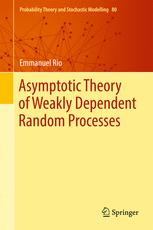

Most ebook files are in PDF format, so you can easily read them using various software such as Foxit Reader or directly on the Google Chrome browser.
Some ebook files are released by publishers in other formats such as .awz, .mobi, .epub, .fb2, etc. You may need to install specific software to read these formats on mobile/PC, such as Calibre.
Please read the tutorial at this link: https://ebookbell.com/faq
We offer FREE conversion to the popular formats you request; however, this may take some time. Therefore, right after payment, please email us, and we will try to provide the service as quickly as possible.
For some exceptional file formats or broken links (if any), please refrain from opening any disputes. Instead, email us first, and we will try to assist within a maximum of 6 hours.
EbookBell Team

0.0
0 reviewsPresenting tools to aid understanding of asymptotic theory and weakly dependent processes, this book is devoted to inequalities and limit theorems for sequences of random variables that are strongly mixing in the sense of Rosenblatt, or absolutely regular.
The first chapter introduces covariance inequalities under strong mixing or absolute regularity. These covariance inequalities are applied in Chapters 2, 3 and 4 to moment inequalities, rates of convergence in the strong law, and central limit theorems. Chapter 5 concerns coupling. In Chapter 6 new deviation inequalities and new moment inequalities for partial sums via the coupling lemmas of Chapter 5 are derived and applied to the bounded law of the iterated logarithm. Chapters 7 and 8 deal with the theory of empirical processes under weak dependence. Lastly, Chapter 9 describes links between ergodicity, return times and rates of mixing in the case of irreducible Markov chains. Each chapter ends with a set of exercises.
The book is an updated and extended translation of the French edition entitled "Théorie asymptotique des processus aléatoires faiblement dépendants" (Springer, 2000). It will be useful for students and researchers in mathematical statistics, econometrics, probability theory and dynamical systems who are interested in weakly dependent processes.